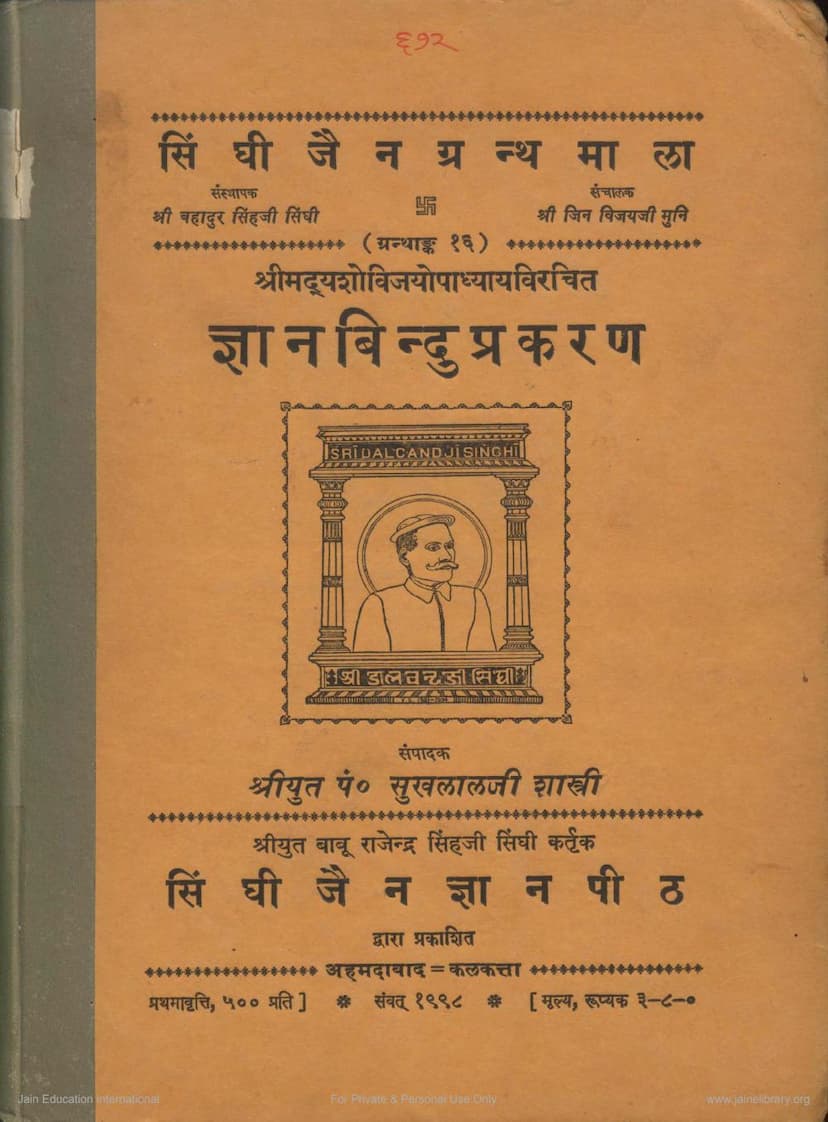Gyanbindu Prakarana
Added to library: September 1, 2025

Summary
Here is a comprehensive summary of the Jain text "Gyanbindu Prakarana" based on the provided pages:
Title: Gyanbindu Prakarana (ज्ञानबिन्दु प्रकरण) Author: Yashovijaya Upadhyay (यशोविजयोपाध्याय) Editor: Pandit Sukhlalji Sanghavi (पण्डित सुखलालजी संघवी) Publisher: Singhi Jain Jnana Peeth (सिंघी जैन ज्ञान पीठ) Series: Singhi Jain Granthamala (सिंघी जैन ग्रन्थमाला), Volume 16
Overall Purpose and Context:
The "Gyanbindu Prakarana" is a profound Jain philosophical work authored by Yashovijaya Upadhyay, a renowned scholar and logician of Jainism. This particular edition is a critical one, meticulously edited by Pandit Sukhlalji Sanghavi and his associates, and published as part of the esteemed Singhi Jain Granthamala. The series itself is dedicated to preserving and propagating significant Jain literature across various disciplines like Agamic, philosophical, historical, and narrative works, in Prakrit, Sanskrit, Apabhramsa, and older vernacular languages. This edition aims to make Yashovijaya Upadhyay's deep insights on the nature of knowledge accessible to a wider scholarly audience through detailed introduction, notes, and indices.
Author: Yashovijaya Upadhyay
Yashovijaya Upadhyay is presented as a highly learned and prolific scholar, considered perhaps the last "Shrutakevali" (one who has mastered the entire Jain canon) in the Jain tradition. His literary output is described as rich and diverse, with each work being a substantial treatise in itself. He is recognized for his profound philosophical acumen and mastery of various Indian philosophical schools, evident in his ability to engage with and synthesize diverse viewpoints. His earlier work, "Jain Tarka Bhasha," was also published by the Singhi Jain Granthamala.
Editor: Pandit Sukhlalji Sanghavi
Pandit Sukhlalji Sanghavi is lauded for his deep scholarship in Jain philosophy and logic. His introduction ("Gyanbindu Parichay") to this volume is considered an original and comprehensive analysis of the text's subject matter. The editor's meticulous work in comparing four manuscript copies and providing extensive comparative notes is highlighted, showcasing his dedication to scholarly rigor. He is recognized for his ability to decipher and elucidate the complex philosophical concepts within Jain texts.
Content and Structure of the Book:
The book is structured to provide a thorough understanding of the "Gyanbindu Prakarana." It includes:
- Introduction (Gyanbindu Parichay): A detailed essay by Pandit Sukhlalji Sanghavi, providing an overview of the author, the external form of the book (title, subject, style), and its internal structure and key philosophical arguments. This introduction delves into the intricacies of Jain epistemology, tracing the historical development of knowledge-related concepts within Jainism and comparing them with other Indian philosophical traditions.
- Original Text (Gyanbindu Mool Granth): The core text of the "Gyanbindu Prakarana" itself, presented in its original Sanskrit.
- Notes (Gyanbindu Tippan): Extensive and critical annotations by the editors, clarifying philosophical definitions, contextualizing discussions with references to other texts, and providing historical analysis of the concepts discussed. These notes are crucial for understanding the depth and nuances of the original work.
- Appendices (Gyanbindu Parishisht): Six appendices that further aid the reader's comprehension, including:
- A glossary of technical terms used in the text.
- A list of relevant books and authors cited.
- Indices for the topics discussed.
- Errata (Shuddhi-Vriddhipatraka): A list of corrections and additions.
Key Philosophical Themes Discussed:
The "Gyanbindu Prakarana," as elucidated by Pandit Sukhlalji, primarily focuses on the Jain theory of knowledge (Pramana). Key themes include:
- The Nature of Knowledge: A general discussion on knowledge as an inherent quality of the soul, its manifestations as perfect (Kevala) and imperfect (Mati, Shrut, Avadhi, Manahparyaya), and the role of karmic obstruction (Ayatana) in limiting knowledge.
- Mati and Shrut Knowledge: A detailed exploration of the distinction between Mati-jnana (sensory and mental knowledge) and Shrut-jnana (scriptural or derived knowledge). This includes analyzing the historical development of the debate on their demarcation, the concept of 'Shruta-nishrita' (knowledge aided by scripture) and 'Ashruta-nishrita' (knowledge not directly aided by scripture) Mati-jnana, and the history of understanding sentence meaning (Vakyartha).
- Avadhi and Manahparyaya Knowledge: The discussion extends to supernatural forms of knowledge, Avadhi (clairvoyance) and Manahparyaya (telepathy), with comparative analysis of their concepts in other Indian philosophical schools like Yoga, Buddhism, and Nyaya.
- Kevala Knowledge: The most extensive section deals with Kevala-jnana (omniscience). This includes:
- Arguments for its existence.
- A refined definition of Kevala-jnana.
- The causes of Kevala-jnana, with a particular emphasis on the destruction of karmic obstructions (Karma-kshaya) and a critique of alternative theories like meditation (Bhavana) and occult forces (Adrishta).
- The role of emotions (Raga, Dvesha, Moha) as obstructions to knowledge and their karmic basis.
- A discussion and refutation of concepts like "Nairatmya-bhavana" (concept of non-self) from Buddhism and "Brahma-jnana" (knowledge of Brahman) from Vedanta, demonstrating their incompatibility with Jain principles.
- An analysis of Vedic and other scriptural passages, reinterpreting them in light of Jain doctrine.
- The relationship and distinction between Kevala-jnana (omniscience) and Kevala-darshana (omniscient perception), exploring different historical Jain viewpoints (sequential, simultaneous, and identical).
- Ahimsa in Jainism: The text also delves into the concept of Ahimsa (non-violence), examining its nature, evolution, and its nuanced application (Nishchaya and Vyavahara) in Jain practice, particularly in the context of the "Utsarga-Apavada" (general rule and exceptions) principle, comparing it with similar discussions in Vedic traditions.
- The Role of Nayas (Standpoints): The editor's introduction highlights how Yashovijaya Upadhyay masterfully employs different Nayas (standpoints) to reconcile seemingly contradictory views on knowledge, particularly in the discussion of Kevala-jnana and Kevala-darshana.
Significance of the Edition:
This edition by Pandit Sukhlalji Sanghavi is significant for its critical approach, making the complex philosophical arguments of Yashovijaya Upadhyay accessible and understandable. The detailed introduction and notes provide valuable context and scholarly analysis, contributing to a deeper appreciation of Jain epistemology and the intellectual legacy of Yashovijaya Upadhyay. The series itself, the Singhi Jain Granthamala, is acknowledged for its role in promoting such critical scholarly endeavors.